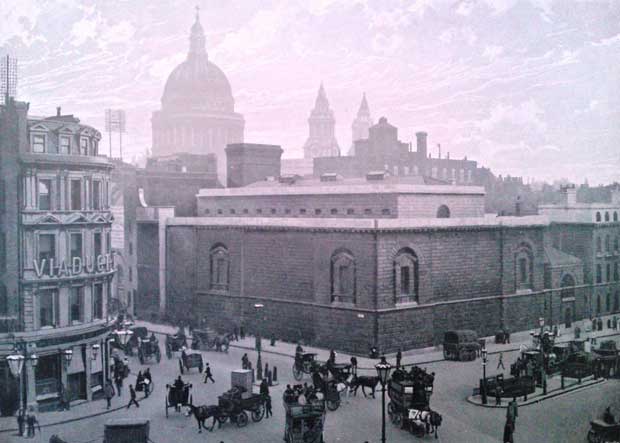Newgate Prison dominated the crime pages of the newspapers throughout much of the 19th century, and on into the early 20th century when it was demolished.
Until 1868, executions were carried out in public in the square in front of the prison, and thereafter they were moved to an execution shed inside.
It was inside that the likes of Mrs. Pearcey and the notorious Reading baby farmer Amelia Dyer were executed.
But many others also ended there days here, and many of the crimes committed were truly horrific, and reflected the social and living conditions of the age.

EXECUTION AT NEWGATE
One such execution was reported in The Weymouth Telegram on Friday the 9th of January 1880:-
Charles Shurety, 29,was executed on Monday morning at eight o’clock. within the gaol of Newgate, for the murder of a child, two years old. named Louisa Piper.
The prisoner was tried before Mr. Justice Lindley at the last session of the Central Criminal Court, and from the facts disclosed in the evidence, it appeared that the prisoner cohabited with a widow named Mary Ann Piper, who had three children, the infant in question, a girl about 12 years old, and a boy 13.
THE LIVING ARRANGEMENTS
The two latter went out during the day, the boy to a Board school, and the girl to some place where she had employment; and the mother, who seemed to have been the principal support of the family, went out to work, leaving the man alone with the infant.
They occupied a back room at 2, Payne’s-row, Kentish Town, and almost immediately after they took possession of the place the other lodgers in the house were horrified at the brutal conduct of the prisoner towards the child, and the revolting language he made use of towards her, his constant threat being that he would kill her.
THE CHILD FOUND DEAD
This threat appears to have been made use of only three days before the child was found lying dead in the room, with its arms and legs drawn up, and showing, by other appearances, that it had died a violent and cruel death.
Some attempts were made to procure a remission of the capital sentence, on the ground that the act was not premeditated on the part of the male prisoner; but the Secretary of State, after reading the evidence, and consulting with the learned Judge who tried the case, and who, in passing sentence, described it as one of the most revolting that had ever come within his experience, declined to give any effect to the efforts to procure a remission of the capital sentence, and, in reply to the application made to him, said that he could not see any ground for interfering.
HE HAD SHOWED REMORSE
Since his conviction the prisoner paid attention to the exhortation of the Ordinary of Newgate, and appeared at last to be fully impressed with the fearful character of his crime. He wrote a letter to the mother of the child, asking her forgiveness and expressing his sorrow.
The Under-Sheriffs, Mr. Crawford, and Mr. Wragg, arrived at the prison shortly before eight o’clock, and they at once proceeded to the prisoner’s cell, where the pinioning was performed by Marwood, the executioner.
The prisoner expressed his thanks for the kindness he had received from all the officials, and particularly to Mr. Sheriff Wollaton for an address he delivered to him a few days ago.
IT WAS A JUST SENTENCE
He at the same time said that he fully acknowledged the justice of his sentence, and that he deserved to die for the dreadful offence he had committed.
He walked to the scaffold without any assistance.
He fell a distance of at least seven feet from the length of the rope.
